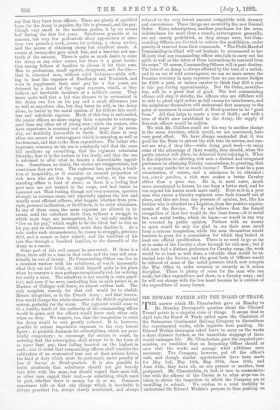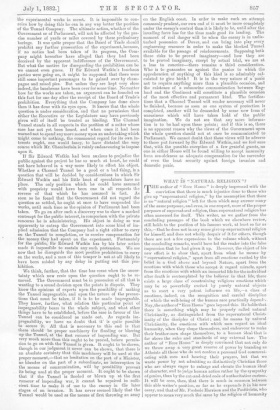SIR EDWARD WATKIN AND THE BOARD OF TRADE.
THE answer which Mr. Chamberlain gave on Monday to Mr. Bromley Davenport's question about the Channel Tunnel points to a singular state of things. It seems that in April last, the Board of Trade called upon the Chairman of the Submarine Continental Railway Company to discontinue the experimental works, while inquiries were pending. Sir Edward Watkin thereupon asked leave to carry on the works a short distance further, as the immediate stoppage of them would endanger life. Mr. Chamberlain gave the required per- mission, on condition that an Inspecting Officer should at once visit the works and arrange what additions were necessary. The Company, however, put off the officer's visit, and though similar appointments have been made for May 3rd, May 10th, May 27th, June 10th, and June 24th, they have all, on one pretext or another, been postponed. Mr. Chamberlain, in fact, is now in communica- tion with the officers of the Crown as to what steps can be taken to obtain the inspection to which the Company are so
unwilling to submit. We confess to a total inability to understand Sir Edward Watkin'a purpose in thus pushing on The experimental works in secret. It is impossible to con- ceive how by doing this he can in any way better the position of the Tunnel Company. The ultimate action, whether of the Government or of Parliament, will not be affected by the pre- cise number of yards or miles covered by these preliminary borings. It was quite proper that the Board of Trade should prohibit any further prosecution of the experiment, because, if no notice had been taken of its progress, the Com- pany might hereafter have alleged that they had been deceived by the apparent indifference of the Government. But what the motive for disregarding the prohibition can be we cannot even guess. If Sir Edward Watkin's luncheon parties were going on, it might be supposed. that there were still some important personages to be gained over by cham- pagne and raised pies.. But unless they are kept very close indeed, the luncheons have been over for some time. No matter how far the works are taken, no argument can be founded on this fact for one day after the receipt of the Board of Trade's prohibition. Everything that the Company has done since then it has done with its eyes open. It knows that the whole question is under consideration, and that no permission that either the Executive or the Legislature may have previously given will of itself be treated as binding. The Channel Tunnel stands in all respects in the position of a suitor whose case has not yet been heard, and when once it had been warned not to spend any more money upon an undertaking which might come to nothing, the commonest regard for its own in- terests ought, one would fancy, to have dictated the very course which Mr. Chamberlain is vainly endeavouring to impose upon it. If Sir Edward Watkin had been anxious to prejudice the public against the project he has so much at heart, he could not have behaved in a way more likely to effect his object. Whether a Channel Tunnel be a good or a bad thing, is a question that will be decided by considerations in which Sir Edward Watkin and his little knot of speculators have no place. The only position which he could have assumed with propriety would have been one in all respects the reverse of that which he has assumed in fact. As soon as he found that the Government did not regard the question as settled, he ought at once to have suspended the works, until such time as the opinion of Parliament had been taken. To go on after such a discovery was to show a marked Ontempt for the public interest, in comparison with the private concerns he is administering. His object in doing so was apparently to entrap the Government into some kind of im- plied admission that the Company had a right either to carry on the Tunnel to completion, or to receive compensation for the money they had spent on the experiment. Fortunately for the public, Sir Edward Watkin has by his later action made it impossible to sustain any such pretension. We see now that he disregards the most positive prohibition to carry on the works, and a man of this temper is not at all likely to have been misled by any delay in putting out this pro- hibition.
We think, further, that the time has come when the uncer- tainty which now rests upon the question ought to be re- moved. The Government must be in possession of all that is wanting to a sound decision upon the points in dispute. They know the opinions of experts upon the possibility of making the Tunnel impregnable, and upon the nature of the precau- tions that must be taken, if it is to be made impregnable. They know, further, what relation this particular point of impregnability bears to the whole subject, and what other things have to be established, before the case in favour of the Tunnel can be considered as made out. As regards im- pregnability, we have no doubt that it is quite possible to secure it. All that is necessary to this end is that there should be proper machinery for flooding or blowing up the Tunnel, at the first rumour of impending war. But very much more than this ought to be proved, before permis- sion to go on with the Tunnel is given. It ought to be shown, though in our judgment it never can be shown, that there is an absolute certainty that this machinery will be used at the proper moment,—that no hesitation on the part of a Minister, no blunder on the part of a subordinate, no interruption in the means of communication, will by possibility prevent its being used at the proper moment. It ought to be shown that if the Tunnel is flooded or blown up at the first rumour- of impending war, it cannot be repaired in suffi- cient time to make it of use to the enemy in tile later stages of an invasion. It has never seemed likely that the Tunnel would be used as the means of first throwing an army
on the English coast. In order to make such an attempt commonly prudent, our own end of it must be more completely under the enemy's control than it is likely to be, until after the invading force has for the time made good its landing. The moment of real danger will be when the enemy is in undis- turbed possession of Dover, and can bring into play every engineering resource in order to make the blocked Tunnel available for the passage of reinforcements. Supposing both these risks to be proved imaginary—and how they are to be proved imaginary, except by actual trial, we are at a loss to conceive—there remains a third consideration. Who is to guarantee us against the panics to which the apprehension of anything of this kind is so admirably cal- culated to give birth ? It is in the very nature of a panic not to require anything more than a plausible occasion, and the existence of a submarine communication between Eng- land and the Continent will constitute a plausible occasion of the most effective and permanent kind. The fortifica- tions that a Channel Tunnel will render necessary will never be finished, because as soon as one system of protection is completed, another will be demanded by some new form of uneasiness which will have taken hold of the public imagination. We do not see that any more informa- tion is to be had upon these points ; and if this is so, there is no apparent reason why the views of the Government upon the whole question should not at once be communicated to Parliament. We cannot doubt that these views will be adverse to those put forward by Sir Edward Watkin, and we feel sure that, with the possible exception of a few grateful guests, no one in either House will be found willing to accept immunity from sea-sickness as adequate compensation for the surrender of even the least security against foreign invasion and domestic panic.



































 Previous page
Previous page